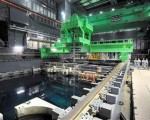Dear Friend and Reader:
Most people think of the nuclear incident at the Fukushima Daiichi power-generating station as something that happened in the past. You don’t see it mentioned on network or cable news, and it’s not on most news websites or in major newspapers.
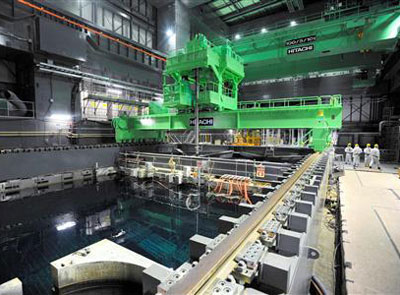 |
|
Cranes have been installed over the spent fuel pool inside the No.4 reactor building at the tsunami-crippled Fukushima Daiichi nuclear power plant, shown Nov. 6, 2013. Photo: Kyodo News Service.
|
You may have heard that in March 2011, Units 1, 2 and 3 at the Fukushima plant experienced total meltdowns after an earthquake and tsunami crippled the cooling systems of the nuclear reactors.
What you probably have not heard is that in each unit, more than 200 tons of radioactive material got so hot that it turned to lava and melted through the containment structure and into the ground under the plants. It’s currently unaccounted for and is threatening the water supply for 40 million people in the greater Tokyo area.
The most recent mention of anything related to the Fukushima situation in The New York Times was an editorial one month ago focusing on the politics of nuclear power in Japan, with the former prime minister saying he was now in favor of a total ban. The editorial mentioned that a large majority (76%) of Japanese citizens are now opposed to the continued use of nuclear power plants.
On Nov. 11, The Washington Post carried a short item about wind-generating stations off the coast of Fukushima, and the next day referenced the same issue that the Times covered in its editorial — how the former prime minister is urging a nuclear power ban.
If you’re not actively researching the topic, or reading news outlets with a specific focus on the issue, you would think it’s over and done with — and have no way to know that the worst may be ahead.
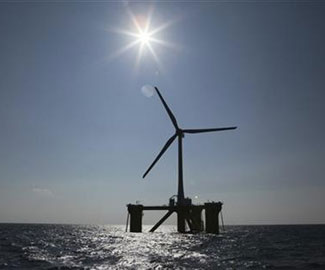 |
|
The future: Fukushima Mirai, a wind turbine off the coast of the crippled nuclear plant, feeds electricity to the grid on the shore. The turbine was built by Marubeni Corp., which is leading the consortium building the offshore wind farm. Photo via Marubeni Corp.
|
For example, if you’re following Energy News, you might have noticed they carried this Reuters article about structural damage at Fukushima Unit 4.
It’s more likely you were watching CNN a week ago Thursday night, and saw a program called Pandora’s Promise that assured the world that nuclear power is absolutely safe, and that it is the only thing that can save the planet from global warming.
Instead of real news reporting about a serious, immediate issue, we got an extended infomercial for nuclear power that was packed with more lies and omissions than I could count.
Nuclear power is an obsolete technology. One of the most interesting things I learned this week is that the last nuclear power plant to be commissioned and put online was ordered in 1973. That’s correct: the most recent nuclear reactor to be put online was ordered 40 years ago. That’s because nuclear power is simply not financially tenable. The industry had its meltdown long before Three Mile Island had its meltdown in 1979.
The Unit 4 Spent Fuel Problem
The most significant Fukushima-related issue that the news is barely mentioning involves the spent fuel pool that’s dangling in the air above the Unit 4 reactor — fuel that engineers hope to remove beginning this month. If successful, removal of the fuel will be the first real mile marker in what may be a 40-year process of fully decommissioning the Fukushima plant. But engineers have a long way to go before they get there.
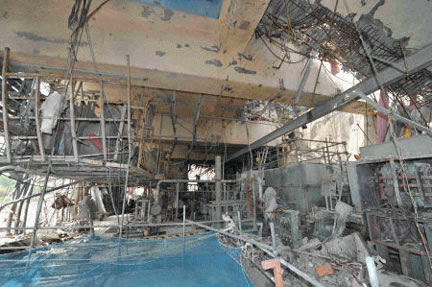 |
|
Interior view of the Unit 4 spent fuel pond room after it was devastated first by an earthquake, then by a hydrogen explosion.
|
The Fukushima Daiichi station had six reactors: Units 1, 2 and 3, all of which melted down, were operating at the time of the quake and tsunami; and Units 4, 5 and 6, which were shut down for inspection at the time of the quake and tsunami. That means their fuel had been removed and was being stored in the reactors’ spent fuel pools, the bottom of which is located 60 feet above ground level. Both new and recently used nuclear fuel must be stored under water at all times, to keep it cool, to prevent it from burning up and to shield against radiation.
In all, Unit 4’s spent fuel pool has 1,331 old fuel assemblies and the 204 working ones that had been removed for the inspection process. Spent fuel is not radioactive enough to boil water efficiently, but it’s still fissionable; that is, even though it’s ‘used up’, it can reach critical mass and a reaction can start. The spent fuel pool is outside the reactor’s containment structure and there are no control rods to slow down any reaction that may start. Worse yet, the used fuel contains many radioactive isotopes that make it more toxic than new fuel — for example, it’s contaminated with types of radiation that attack specific organs, such as the bones or the thyroid gland.
Unit 4 sustained serious damage as a result of events that started with the earthquake. Units 3 and 4 shared a common ventilation system. The meltdown in Unit 3 released hydrogen gas, which caused that reactor to explode. Some of the hydrogen got into Unit 4, which experienced an explosion that badly damaged the structure. This has left hundreds of tons of nuclear fuel suspended above the Earth in a building that is listing over, and is vulnerable to another earthquake. In addition, the fuel removal equipment was damaged beyond repair, and the spent fuel pool was filled with debris that fell from the partially collapsed building.
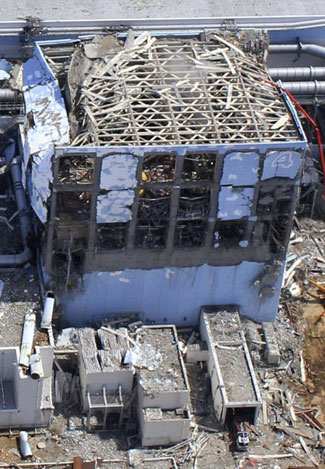 |
|
Exterior of Unit 4 after it was damaged by an earthquake, tsunami and then by a hydrogen explosion. Note the truck on the lower right side of the image, near the tunnel — that gives you a sense of the scale.
|
The main problem is that if the water leaks out of the pool, or if an earthquake causes the partially collapsed building to give way, the fuel will be exposed. It will likely catch fire, and critical mass (nuclear fission) will resume. There would be no way to control or contain such an event.
Engineers have known for a while that they have to get that fuel out of there, though between delays and the extensive preparations necessary, it’s taken till now to be ready to begin.
Since the March 11, 2011 quake, there have been 12 aftershocks or quakes in the region of the plant, which the damaged structure has thankfully survived.
There is, in effect, a race against the clock to get the 1,534 fuel assemblies out of the spent fuel pond and onto safer ground before a large earthquake knocks the building down, taking more than 400 tons of highly radioactive material with it.
But this is an extremely dangerous process. The fuel assemblies must be under water at all times, or they will overheat. The water also prevents the fuel assemblies from ramping up their radioactive reaction and keeps them from reaching critical mass.
Fuel rods within the assemblies are coated in an explosive, flammable metal (zirconium alloy), which cannot be exposed to the air, overheat or make contact with anything else.
If one small thing goes wrong, we could experience a disaster “of hemispheric proportions,” in the words of Paul Gunter, who heads the organization Beyond Nuclear.
By that, he means that a radioactive plume created by hundreds of tons of fuel burning would be far worse than the original incident at Fukushima and deliver a deadly stream of contamination to North America in a matter of days.
Such an event would also render the entire Fukushima site off-limits to people, yet every individual issue at the site requires constant human intervention. If the site is so radioactive that no humans can manage it, the situation will inevitably get far worse.
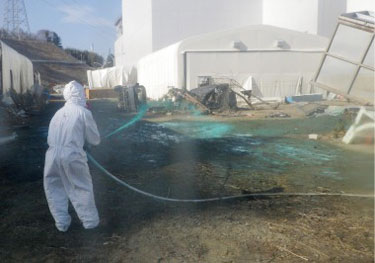 |
|
TEPCO employee tests an anti-scattering agent, designed to contain radiation, on the shared spent fuel pond located near Unit 4. The pond, which is outdoors, holds more than 6,000 spent fuel assemblies. Photo via World Nuclear News.
|
For example, there are an additional 6,375 fuel assemblies in a spent fuel pond that was used by all six reactors. It’s located so close to Unit 4 that a chain reaction could be set off if there is a loss of control of the nuclear material during the Unit 4 procedure.
“The key is getting that first domino not to fall,” Gunter said in a Planet Waves interview this week [listen to the full interview here]. But he said he’s concerned that TEPCO — the Tokyo Electric Power Co. — is still in charge of the situation.
“We run an unparalleled risk to put this in the hands of the utility that brought us this problem and that has a record for obfuscating and falsifying safety records in order to cut financial corners,” he said. “Really, this should be in the hands of an independent group of scientists and engineers with total transparency. But we are not going to be afforded that level of care.”
TEPCO exercised astoundingly bad judgment in developing the plants. During construction, it removed 80 feet of natural grade that would have protected the site from the tsunami, by the ocean in a tsunami zone. This was done for the convenience of moving construction machinery in and out, and so that it would be cheaper to pump water into the plant.
The utility moved the reactor site closer to the ocean, and then planned only for a maximum 10-foot tsunami when the one that struck the plant was 40 to 50 feet high.
We All Live Downwind from the GE Mark 1
It’s easy to think that because this is happening in Japan, it cannot really hurt people in other parts of the world. But when the radioactive plume was first released in March of 2011, it reached North America in a matter of days.
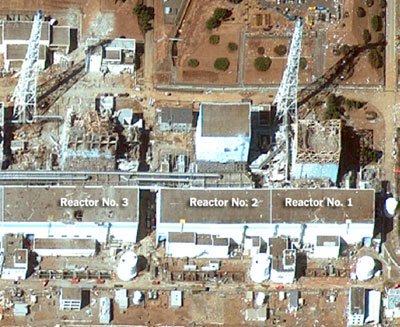 |
|
Scene of devastation at the Fukushima Daiichi plant after earthquakes, the tsunami and hydrogen explosions. Shown are the three reactors that had total meltdowns. Unit 4 is to the left of Unit 3.
|
EPA data shows that the highest U.S. levels of radioactive Iodine-131 (I-131) in drinking water after March 17 were found in Philadelphia. I-131 is a direct product of a nuclear meltdown.
Philadelphia, in the part of the U.S. furthest from Japan, also reported a 48% increase in the mortality rate for babies immediately following the incident.
Joseph Mangano, executive director of the Radiation and Public Health Project, said, “Philadelphia infant deaths reported to the CDC [Centers for Disease Control, a U.S. government agency] averaged 5.0 per week for the five weeks ending March 19. The average jumped to 7.4, a 48.0% increase, in the following 10 weeks.” Other American cities experienced infant mortality rate increases, but Philadelphia had the highest level of increase.
Gunter, the director of Beyond Nuclear, said he’s concerned that the public will not have access to accurate information if something goes wrong.
“Once they lose control of the nuclear reaction, typically with all these accidents — Three Mile Island, Chernobyl, Fukushima — they seek to control the information,” Gunter said. “And that is where we remain behind the information curve. The lack of transparency, the fact that Tokyo Electric Power Company who ultimately were responsible for the cost cutting that led to the vulnerability that now has us in this potentially hemispheric catastrophe — they are in charge of this potentially hemispheric catastrophe. They are in charge of this very precarious game of pick-up sticks with these radioactive fuel rods.”
The problem potentially can come home in other ways as well. The type of nuclear plant that failed at Fukushima Daiichi, called the General Electric Mark 1, is widely used in the United States. There are 23 Mark 1 reactors at 16 locations in the U.S. The Mark 1 is high on the long list of things that should be a scandal but are not.
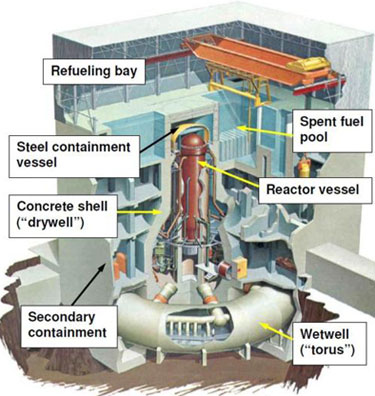 |
|
Diagram of the GE Mark 1 reactor, three of which melted down at Fukushima. The structure is about 40 meters high. Note the location of the spent fuel pool, next to the reactor core, high above ground level. The backup generators — to keep the plant cool in the event of a power loss emergency — are located in the basement, and flooded the moment the wave struck the facility.
|
The problems with these reactors were so well established, Gunter said, that in 1976 three General Electric engineers resigned their positions because they knew that the Mark 1 was not a quality product. Gunter called the design a “pre-deployed booby trap.”
Among other strange design features, the reactors have their spent fuel ponds high above the ground, where they can fall to Earth, especially in an earthquake zone. The backup generators for this type of plant are in the basement. This was done even when the plants were installed in a tsunami zone, right on the water. When the wave came, they flooded instantly — that’s why they were destroyed at Fukushima, resulting in failure of the backup power, then the cooling systems, and thus leading directly to a meltdowns of the reactors.
And their control rods are inserted upwards from underneath, which requires electric and hydraulic power, rather than having them drop down from above with the help of gravity. Except for an atomic bomb, the Mark 1 seems to be the stupidest thing ever invented, with each unit loaded with 200 tons of uranium or uranium/plutonium mix.
According to a March 2011 New York Times article in response to the Fukushima incident, in 1972, Joseph Hendrie, who would later become chairman of the Nuclear Regulatory Commission (NRC), said it would be a good idea to ban the design. But he said that the technology had been so widely accepted by the industry and regulatory officials that “reversal of this hallowed policy, particularly at this time, could well be the end of nuclear power.”
This is atomic logic at its purest: save the plant design, to save nuclear power itself — and threaten the planet.
The Nuclear Axis: It’s About Saturn
The astrology of the nuclear issue is one of the most interesting and revealing astrological case studies I’ve ever encountered.
The base chart for astrological nuclear studies is set for the time of the first self-sustaining nuclear reaction, which took place at 3:25 pm on Dec. 2, 1942 in Chicago. Scientists know this as Chicago Pile 1, an experiment that took place beneath Stagg Field at the University of Chicago under the supervision of none other than Enrico Fermi. This chart is sometimes called the Nuclear Axis because its backbone goes across Gemini-Sagittarius; that is the axis.
 |
|
The original Stagg Field at the University of Chicago, beneath which was hidden Enrico Fermi’s lab where the first self-sustaining nuclear reaction was created in 1942. The stadium is shown in 1927 and has since been demolished. Photo from the Encyclopedia of Chicago via Wikimedia Commons.
|
In May, I was made aware by Mark Lerner, former editor of Welcome to Planet Earth, of a controversy involving the time zone. For years, astrologers who used this chart used Central War Time (the equivalent of Daylight Savings Time). Once the U.S. entered the war, the whole country was on War Time, including at the time of the experiment in 1942.
However, documentation has recently surfaced which states that the time of 3:25 pm should be in Central Standard Time. [Those curious may refer to footnote 995 in The Book of World Horoscopes by Nicholas Campion, 2004 edition, which explains the issue.]
Both charts have Taurus rising, so by the classical whole-sign house method, the houses remain the same. Over the past few weeks I have looked closely at both of the Nuclear Axis charts (original and revised) and checked them against several major nuclear incidents, including the first atomic bomb test in 1945 (the Trinity Test), the bombs dropped on live targets in Japan, Three Mile Island, Chernobyl and several others.
The revised (CST) chart has some validity, but it does not leap out as being inherently correct or better than the original chart (in CWT). Based on my research so far, I can find no compelling astrological reason to change the time zone. Note that a one-hour shift of the time zone does not change the positions of the planets by more than a fraction of a degree; rather the change moves the ascendant forward by about 22 degrees.
Besides the original chart standing up to years of use, and the gut check, there’s at least one compelling reason to keep it: the positions of two of the original three centaur planets. The original (CWT) chart has Nessus on the ascendant and Pholus on the midheaven.
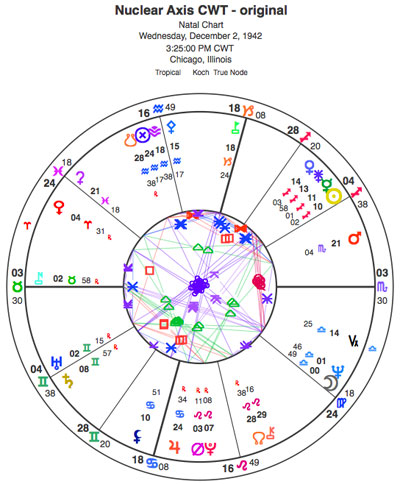 |
|
The nuclear axis chart, the horoscope for the first self-sustained atomic reaction. Note the position of Pholus, in light green, to the left of the midheaven, and Nessus, in light blue, just above the ascendant. Both help clarify the nuclear issue.
|
I have seen these points turn up angular for significant disasters enough times that they are making a clear statement in the CWT chart. Understanding Pholus and Nessus seems essential to understanding the nuclear issue.
Nessus, which tells the story of the manifestation of karma in a cyclical way, is an important planet in the nuclear charts. Nessus is about what is inflicted on someone (in the myth, a poison) that comes back to kill the original poisoner. The bottom line with Nessus is, who ultimately takes responsibility? That’s the name of the game with nuclear issues: everyone is trying to pass the buck. When the time comes for someone to take responsibility, it’s a little too late.
Pholus, which is about the release of something that cannot be re-contained, and multigenerational issues, is on the midheaven in Capricorn, right at the beginning of the 10th house of government. The nuclear endeavor is very much a government enterprise. It is not profitable. Industry cannot afford to pay for the results of nuclear disasters. Government is involved in every step of the process. But it has no magical power to stop a meltdown or to contain radiation.
This whole issue of the Nuclear Axis chart and what it says (along with the time controversy) deserves an extensive article or even a monograph. For now, I’ll note that I am aware of the one-hour time discrepancy, I am tracking both charts and for now, I’m sticking to the original CWT chart.
The ‘axis’ in the nuclear axis runs across Gemini and Sagittarius, occupying the first 15 degrees of those signs. When planets come along and make transits to the axis, nuclear incidents seem more likely to occur.
 |
|
Enrico Fermi designed the Chicago Pile 1 experiment that is the basis of the nuclear axis chart. In his own natal chart, he had the opposition of Uranus and Pluto across the Nuclear Axis, in mid Gemini-Sagittarius.
|
The most sensitive point in the Nuclear Axis chart appears to be Saturn. It’s placed at 8+ degrees of Gemini. And, with dependable consistency, in most of the charts for nuclear incidents, Nuclear Axis Saturn is taking a transit — sometimes even from transiting Saturn. Currently, Chiron is square Nuclear Axis Saturn.
Neptune is in early Pisces now, making a wide square to Saturn (it will be exact in March 2015). Later that year, Saturn arrives at 8+ Sagittarius, opposing Nuclear Axis Saturn. So we will be dealing with this for a while — and 2015 promises to be an extremely important turning-point year for the nuclear issue. From the look of the chart, it could be the time of another major incident, since that Saturn is so sensitive.
One of the most compelling current transits to the Nuclear Axis chart is that Neptune, currently in Pisces , is exactly square Nuclear Axis Uranus in Gemini. That is the picture of a disinformation campaign. We cannot trust anything we’re hearing now, which is very little — with nuclear issues, no news is bad news.
Or as was the case with Pandora’s Promise, the purported documentary turns out to be a propaganda film, designed to obfuscate the issue entirely, deny the dangers and push an antiquated technology on the public.
Neptune making a square to Uranus is also the picture of uranium (Uranus) breaching containment (Neptune penetrates boundaries; neptunium is also a radioactive element). And perhaps the most troubling picture this aspect presents is denial of the dangers of radiation, and denial of the fact (Neptune) that these accidents happen spontaneously (Uranus). Everything can go great for 30 years, then one day the plant blows up. With nuclear power, precedent has very little value.
The Fukushima Chart
Let’s check in with one other chart and see if we can find a message. That’s the chart for the earthquake on March 11, 2011. What is remarkable about this chart is that Uranus is at 29 degrees of Pisces and 57 minutes, at the very, very, itty, bitty, last little tip of the zodiac.
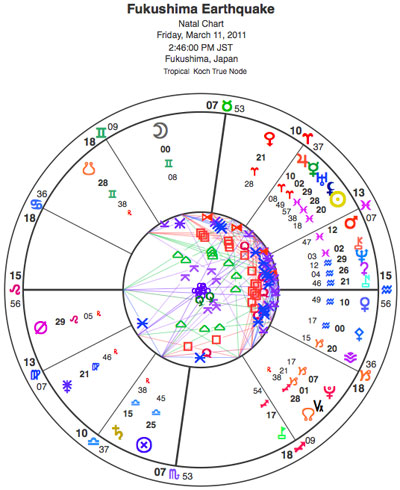 |
|
Chart for the Fukushima earthquake. Note Uranus, in blue on the upper right side of the chart, is in the last degree of Pisces. Note as well the prevalence of planets in Pisces, plus Pholus in Sagittarius and the Moon in Gemini — all influencing the Nuclear Axis.
|
It’s just hours away from making its final ingress into Aries. The chart is set for 2:46 pm Tokyo time, which is about 12 hours ahead of New York time. I remember that night well — for some reason I woke up at about 3 am and turned on the television and saw the news report, which of course said that there were a lot of nuclear power stations in the area but that everything was fine.
Here is our first blog post from that morning, by Karl Grossman, which explains the problem with vivid clarity, describing the chain of events likely to unfold.
In the earthquake chart, the nuclear axis is loaded — Neptune, Chiron, Mars, Pholus and the Moon are all there. Saturn in the Fukushima chart is making a square to Pholus in the Nuclear Axis chart. There are many other aspects, and both the Nuclear Axis and the Fukushima charts are taking many transits now.
Perhaps the most unusual bit of astrology surrounding Fukushima happened the week before. Exactly one week before the incident, I published my first article on the planet Borasisi, a Kuiper object just a bit past Pluto. I called the article With Love from Borasisi.
The article addressed the lies of science and why people are so often inclined to believe them. Borasisi comes from the Kurt Vonnegut novel Cat’s Cradle. He was inspired to write this while working as a PR man at General Electric. The book is essentially a GE-inspired protest against the bomb. The nuclear power industry was essentially a jobs program for scientists who had developed the atomic bomb once the war had ended. In the article, I commented on my personal knowledge of GE’s ethics.
If I were to call up the GE pubic relations department right now and say, “Hello, I’m a reporter. Are PCBs toxic?” they would fax back a press release that says they’re no more toxic than table salt. That is GE, and this attitude — along with all the lies connected to the atomic bomb — is what propelled Vonnegut to write Cat’s Cradle. He says so in this interview.
One of his comments is that science is supposedly interested in pursuing ‘the truth’, but doesn’t care what happens with the results of its discoveries. In the interview, he gives the example that ‘the truth’ is what exploded over Hiroshima.
I continued:
Vonnegut challenges his readers with the idea that [the lies of religion] are actually fairly harmless contrasted to the ‘truths’ of science. He’s not exactly offering any commendations to either, just showing us the contrast. The lies lead to people being temporarily happier. Truths lead to mushroom clouds and Superfund sites so large nobody knows how large.
One week later, the GE-designed nuclear power plants in Fukushima blew up — and now we have a problem so large we don’t know how large.
We know that ocean contamination has reached northern Alaska and may have immediately caused a spike in infant deaths in Philadelphia. Radiation knows no boundaries. This is in reality a problem without a solution.
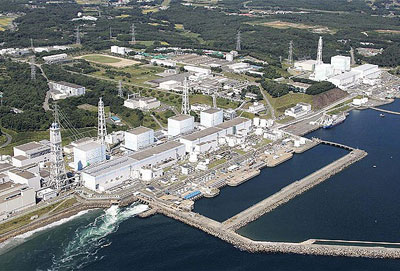 |
|
Fukushima before the accident, containing six Mark 1 reactors — the prefabricated booby traps. TEPCO lowered the grade 80 feet to make the plants closer to the ocean — and the Great Wave that has been a respected feature of Japanese life for many centuries — till now.
|
It’s a situation that might be mitigated, but which we’ll have to deal with for the rest of our lives. We might be able to prevent future problems — some world leaders do seem to be catching onto this, such as Andrea Merkel in Germany, who shut down her country’s nuclear plants after Fukushima happened.
The nuclear issue is the result of science: that is to say, science without conscience, oblivious to common sense right down to the existence of gravity, which has devised the most expensive conceivable way to boil water, with hundreds of them strewn around, often placed on fault lines, any one of which could one day easily contaminate the entire Northern Hemisphere. As Paul Gunter of Beyond Nuclear pointed out, electricity is the “fleeing byproduct” of a nuclear plant. The real product is radiation, which future generations will inherit having seen no benefit of the electricity that was generated.
The fuel removal from Unit 4 is set to begin sometime in the next week or so; nobody knows exactly when. Enormous preparations have been made to secure the process. This webpage explains the process, and don’t miss the video that gives a nice illustration of how it will be done — and makes it seem really simple, and assures us that nothing could possibly go wrong.
Not even an earthquake.
Lovingly,

This article was the result of months of research conducted by Planet Waves Alpha Class interns Elizabeth Michaud and Chad Woodward. You can find some of that research here, including a good selection of nuclear incident charts. Special thanks to Dr. Karl Grossman.
PS — I didn’t cover half of what I wanted to cover in this article. I will be back next week with a discussion of food contamination and why you don’t want to eat any fish out of the Pacific Ocean or anything at all from Japan.
![]()
Full Moon and Venus-Pluto Coverage
I didn’t have time to write a new SKY article this week; the nuclear thing took a while. However, I have covered the passage of Venus through the Uranus-Pluto square, and Sunday’s Taurus Full Moon, in Thursday’s edition of the Planet Waves blog. Also, the horoscope below is focused on the Full Moon square Nessus in Aquarius. — efc
![]()
Bumpy Ride Continues for Health Care Law
Since the rollout of the healthcare.gov website on Oct. 1, nearly a million people have created accounts and determined their eligibility, and nearly 400,000 have been determined eligible for Medicaid. The number who’ve actually signed up is considerably smaller — 106,185 as of Wednesday, with only a quarter of those having done so through the federal website rather than state-established exchanges.
 |
|
Even Jon Stewart can’t seem to help Obama; a recent NPR story notes that the Daily Show’s ACA jokes may be souring the needed millennial generation on enrolling.
|
On Thursday, Pres. Obama put the brakes on certain provisions of the Affordable Care Act, telling insurance companies they could delay one year in implementing certain provisions of the law.
Meanwhile, millions of people have gotten cancellation letters from their insurance companies with offers of more expensive policies that will comply with the minimum standards of the Affordable Care Act. Obama’s oft-repeated statement that “if you like your health care, you can keep it,” has been widely denounced as a lie, thanks to his failure to add, “unless your current policy is really awful.”
The healthcare.gov website has been subjected to 16 cyber-attacks during its snarled rollout, and a woman who allowed her image to be used on the front page (it’s since been removed) experienced a massive wave of cyber-bullying as a result.
It’s impossible to guess how many of the 900,000 or so who window-shopped but didn’t buy might be waiting to see what will happen when the dust settles, but if so they’re likely to have a long wait. Each new scrap of news surrounding the ACA is met with howls of right-wing outrage and savage glee; Obama’s apology for misspeaking has not sufficed, nor, apparently, his offer to allow the policies currently being cancelled for not meeting ACA minimum standards to continue for another year. Bills introduced by both Democrats and Republicans would do the same.
What’s ironic is that the ACA, in its current form, was developed with a great deal of input from the insurance lobby, resulting in the complex, 2,000-plus-page bill that required a massive new system instead of single-payer or Medicare for all. The controversial individual mandate section originated in a right-wing think tank in the late 1980s. Also largely forgotten: the rocky launch of George W. Bush’s Medicare Part D, which also experienced initial glitches and low numbers back in 2005, and is now wildly popular.
Bet Canadians Wish They Had Recall Elections
Unsavory revelations about Toronto mayor Rob Ford have come thick and fast over the past week. First a long-rumored video of him smoking crack surfaced. Then came the video of his drunken rant in which he threatened violence against some unidentified adversary. On Wednesday, documents were released that detailed law enforcement concerns about Ford’s drugging and drunk driving.
 |
|
“Hey Sister, mind if I hide my stash under your habit? They’ll never frisk you.” Toronto mayor Rob Ford, after receiving the OMFG You’re A Mayor? award. Photo: City of Toronto / Wikimedia Commons.
|
At a heated city council meeting Wednesday night, Ford admitted to having bought drugs while in office. All but two of 43 city council members voted in favor of asking him to step down, at least temporarily, which he’s repeatedly refused to consider.
He responded by suggesting that drug use is a commonplace open secret among Toronto’s leadership. The council has no legal power to remove a sitting mayor.
Ford, who had already built a track record of loathing for things like bike lanes, gay rights and poor folks, was elected in a conservative pushback from suburbanites who felt that “their” Toronto was in danger of becoming too liberal.
One wonders how those good suburbanites are feeling now. U.S. citizens in comment threads have repeatedly offered to trade Texas Republican Ted Cruz for Ford, an offer most Canadians don’t seem inclined to accept.
Toronto’s next municipal elections will be held in 2014.
![]()
Poisonous Fruits of War: Soldiers’ Crimes at Home
We all know war is toxic in the places it’s waged. In They Were Soldiers: How the Wounded Return from America’s Wars, journalist and humanitarian aid worker Ann Jones rips aside the veil of denial about how toxic it is for the invaders, something the mainstream media avoids like the plague, favoring “Support Our Troops” memes instead.
 |
|
Trained to kill, they kill at home, too; also, violent sex crimes by soldiers have almost doubled over the past five years. Photo: US Army file photo.
|
Jones, whose past works include War Is Not Over When It’s Over and Winter in Kabul, embedded herself on the front lines in 2010-2011 and then took a step further, tracing the paths of wounded combat veterans as they came home to Walter Reed hospital and eventually to their families, still bearing the scars of mind-rape.
Piecing together crime stories from local news outlets around the country, it became clear to her that returning soldiers are often unable to shed the combat-ready mindset they’ve been saddled with, leaving them prone to committing further violence.
“A lot of them kill their wives or their girlfriends or their children. A lot of them, quite surprisingly to me, kill other soldiers. Many of them kill perfect strangers. And of course a great number of them kill themselves. And then there’s the drinking and drugging and all of that that goes on. And I think that the press has been remiss in [not] putting that all together,” Jones told Salon magazine’sJosh Eidelson.
Jones places the blame for all this right where it belongs: on our government’s addiction to pointless warfare and the insufficient support systems back home, including mass drugging of veterans with Big Pharma’s offerings. The problem is nothing new — there are 223,000 veterans currently in prison, and 50,000 veterans of World War II were still in psychiatric institutions 20 years later. But with two very long wars winding down, she argues, it’s not going to be getting better.
![]()
Veil Thins for the Families of Those Buried in Mass Grave
Unbeknownst to the vast majority of New Yorkers, the nondescript Hart Island in Long Island Sound is the largest mass grave in the United States. Gizmodo’s feature story on Hart Island, one of New York City’s strangest open secrets, published just as Mercury in Scorpio was beginning to trine Neptune and preparing to station direct, with the Sun also in Scorpio — perfect astrology for news of the dead.
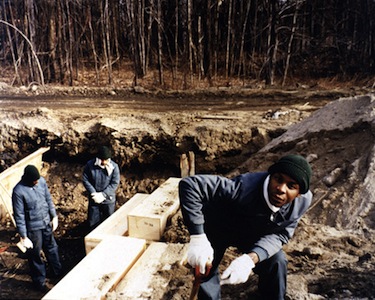 |
|
Inmates completing a burial at Hart Island, 1992. Photo by Joel Sternfeld, from Melinda Hunt’s book Hart Island.
|
Nearly 900,000 unclaimed bodies are buried on Hart Island — anyone who cannot be identified and claimed in the city morgue for more than two weeks — without grave markers, without ceremonies, and often without the knowledge and consent of their families.
Infants stillborn to grief-stricken (and often poverty-stricken) parents who check off the box for a “city burial” end up here, buried by Department of Corrections inmates who, according to the article, “earn 50 cents an hour digging gravesites and stacking simple wooden boxes in groups of 150 adults and 1,000 infants.”
But if those parents ever try to find their child’s grave, the search can feel futile; there is no official map of gravesites, and many burial records were destroyed in a fire in 1977. Remaining records are in the Municipal Archives in Manhattan or held by the prison system.
In response, artist Melinda Hunt initiated The Hart Island Project, a non-profit organization seeking to assist families in their searches, and to shift control of Hart Island from the DOC to the Parks Department. Hunt would like to make it a true public cemetery and park, and in the process of publishing a book about Hart Island in 1998 and helming her non-profit, she has become its most knowledgeable historian and the only real political and legal advocate for the families of those interred there. In 2008, the Hart Island Project was granted 50,000 burial records through a Freedom of Information Act request.
The publicity is good news for anyone wondering about the final resting place of a lost loved one in New York — but publicity is a double-edged sword. As one friend of Planet Waves who lived near Hart Island wrote in, “[I] hope they don’t get too much publicity — developers have always drooled over it. … but Hart Island, desolate still, an inadvertent bird sanctuary — maybe not a bad place to be buried, amid the metropolitan hurly burly.”
![]()
Swiss Study Points to Arafat Poisoning
Swiss scientists have found at least 18 times the normal levels of the radioactive element polonium-210 in Yasser Arafat’s bones. They are 83% confident that the late Palestinian leader was poisoned with it — yet there’s no clue who did it.
 |
|
Yasser Arafat.
|
Al Jazeera’s 2012 documentary Who Killed Arafat? triggered a French murder investigation that led to the exhumation of Arafat’s remains last November. Arafat, the first president of the Palestinian National Authority, died in a Paris hospital in November 2004 after falling ill suddenly the previous month.
Samples of his remains were shared by the Swiss team, a French team of judges and forensic experts, and a Russian group invited at the request of the Palestinian National Authority.
The University Centre of Legal Medicine in Lausanne announced the findings in a report obtained exclusively by Al Jazeera. The Russians are expected to disclose their results soon; the French are not expected to release their results before the murder investigation concludes.
Chief suspects in the poisoning are Arafat’s Palestinian rivals. Most point to the Israeli government, which denies it had anything to do with Arafat’s sickness or death. No evidence has surfaced implicating Israel, though it had control over all provisions coming in and out of the Palestinian territory.
One source told Planet Waves: “At the top has to be the Russians or one of their proteges — and that is a big circle in which are a lot of Arab/Muslim power players who wanted him out of the way for a multitude of reasons which run the full spectrum.”
“We can’t point a finger at anyone,” Suha Arafat, Yasser’s widow, said in an interview with Al Jazeera. “The French are conducting a serious investigation. It takes time.”
![]()
‘Contested Science’: Distorting the Truth
When a government or company disagrees about the validity of the results of a scientific study, one way to handle that is to come up with other research that contradicts it, and declare the original study ‘contested science’.
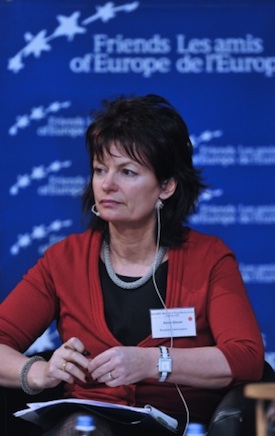 |
|
Anne Glover is the science advisor to European Union President Manuel Barroso. Photo courtesy of Friends of Europe.
|
While not always the case, it can be a red flag for hidden, and sometimes deadly, agendas; be sure you know the back-story of who is doing the contesting.
‘Contested’ has been deliberately misused to imply ‘invalid’. All a company has to do is say the evidence of its product’s harm is ‘contested’, and the public can — and does — assume it is safe. Sometimes this is based on actual research; sometimes it’s fabricated. As long as there is a controversy, the purpose of creating doubt is served.
This strategy appears to be behind European Union’s choice to back GMO crops in Europe. This is significant because the European public has not supposed GMO crops, and has indeed been consistently opposing their use.
Anne Glover, the chief science advisor to EU president Manuel Barroso, in September backed a review by the European Academies Science Advisory Council (EASAC), saying studies linking GMO crops with serious life-threatening effects on the environment and animal and human health are contested science — making the leap to the notion that as a result, these crops are actually safe. She suggested EU countries should rethink their bans on GMOs.
At the heart of the controversy is a study conducted at the University of Caen in France, published in September 2012, which found that rats fed on a diet containing NK603 — a maize seed variety doused with Monsanto’s Roundup herbicide — or given water with Roundup at levels permitted in the United States, died earlier than those on a standard diet.
The EU food agency’s review said the analysis contained in the study, led by biologist Gilles-Éric Séralini, was insufficient and asked for additional evidence to prove that here is really a danger. The one danger that the EU was concerned about is economic — the “grave scientific, economic and social consequences of current European Union policy towards GM crops,” that policy being a ban.
Glover then leaped to the conclusion that there is no evidence that GM technologies are any riskier than conventional breeding technologies and this has been confirmed by thousands of research projects,” speaking to EurActiv, the official EU public relations agency.
Note that the logic here is that the EU government is demanding that the food be proven dangerous rather than having the manufacturer prove that it is safe. Opponents to GMO technology noted that Caen study also received backing from the national science academies of all EU member states, plus Norway and Switzerland.
The Caen was called ‘contested science’ despite the research providing some of the strongest evidence to date of how deadly GMOs are. Caen scientists exposed rats over their entire lifetimes — not just for 90 days as is typical. The rats were found to be at higher risk of suffering tumors, multiple organ damage and premature death.
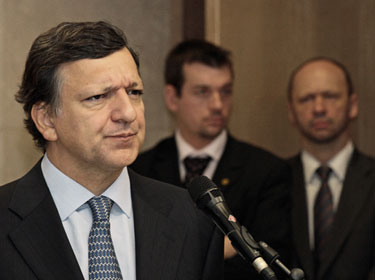 |
|
Manuel Barroso is president of the EU. His science advisor is Anne Glover. She is recommending that he dismiss studies indicating that GMO foods are dangerous, despite widespread concerns in Europe. Photo by Eric Francis.
|
Monsanto, which is the leader in biotechnology and GMO crops, has often tried shoot down studies in an attempt to prove that their products or byproducts are safe. Perhaps the best example is dioxin, known to be one of the deadliest substances on Earth, just one tier below plutonium.
In the late 1970s Monsanto scientists produced a series of studies on dioxin, seemingly as independent researchers. Many of Monsanto’s chemical processes created dioxin as a byproduct. One was called the Zack-Gaffey study, which concluded that dioxin is not a serious carcinogen. This was dropped into the midst of a debate spurred by vets returning home from Vietnam sick with Agent Orange poisoning, the Love Canal incident and an incident which resulted in the closure of an entire town, Times Beach, Missouri.
Though entirely fraudulent, relying on made-up data, the Zack-Gaffey study was published in the Journal of the American Medical Association, contributing to the idea that dioxin is not so bad.
In the early 1990s, the paper industry, the Centers for Disease Control (CDC) and a New York Times writer and editor conspired to plant a series of stories on the front page which concluded that, despite considerable evidence of dioxin’s dangers, the chemical was no more dangerous than sunbathing.
This created the illusion of ‘contested science’ — though no scientific study was ever conducted that came to that conclusion. It was just the author, Keith Schneider, and his editor at the Times who came up with the idea.
How can you spot “contested science?” The easiest way is by following the money — see if you can figure out who funded the study. Look for the associations of the scientists. Who do they work for, or what entities are on their resume? If the study was done at a university, investigate its history, and especially its directors. Often industry officials and board members of companies sit on the boards of universities and blatantly control the science produced. Examine vested interests — they usually lead to useful information.
![]()
Typhoon Haiyan Raises Climate Conference’s Stakes
Nature is sending a message: for the second year in a row the UN Climate Change Conference has coincided with a devastating storm in the South Pacific. Last December, Typhoon Bopha ravaged the Philippines while the UN held its summit in Doha, Qatar. Four days before the start of the 2013 UN climate conference in Warsaw, Poland, another category 5 typhoon hit the Philippines and neighboring countries.
Called Yolanda in the Philippines, Typhoon Haiyan was so strong it exceeded the scales used to measure satellite weather intensities.
 |
|
Yeb Sano, the Philippines’ climate commissioner, as he begins a voluntary fast in protest at the lack of action on global warming. Photo: Kacper Pempel/Reuters.
|
Initially the death toll was feared to exceed 10,000; as of yesterday, the official toll stood at 2,357. At least 11 million people have been affected, over 600,000 displaced.
Typhoon Haiyan made landfall with 195 mile-per-hour winds, pushing a storm surge of water similar to a tsunami onto land.
Jeff Masters, director of meteorology at the Weather Underground, told Amy Goodman this week that rising sea levels caused by global warming increased the size of the storm’s surge.
Warming oceans are also a factor in creating more extreme storms, because the storm systems draw all of their energy from the heat in the ocean.
Jamela Alindogan, a reporter for Al Jazeera in the Philippines, described experiencing Haiyan on Democracy Now! Tuesday:
“And all of a sudden the entire roof is gone, and we were exposed to this beast, this incredible power that is really unimaginable. The sound is absolutely terrifying. It is horrific. I mean, it’s beyond what anybody else could imagine. I have covered armed conflict, but there is nothing like this, nothing as incredible and as scary as covering a natural disaster like Typhoon Haiyan.”
With poverty in the Philippines as high as 36 percent, the need for food, water and medicine is dire, highlighting the inequities between developed and developing nations that impact their willingness to push for meaningful action on global warming.
Naderev “Yeb” Sano of the Philippines Climate Change Commission implored attendees of last year’s talks in Doha to take real action. This week, his hometown in ruins after Haiyan, Sano wept openly during his Warsaw address.
“The climate crisis is madness. We can stop this madness. Right here in Warsaw.”
Sano ended his speech with an unscripted pledge: “In solidarity with my countrymen who are struggling to find food back home … I will now commence a voluntary fasting for the climate … I will refrain from eating food during this [conference] until a meaningful outcome is in sight.”
![]()

Pull the Veil Aside and Step Through
Have you ever wanted to step into a surreal world and let its hinted-at stories of curious joy and dark-edged mystery take you to strange places within yourself? Try the fantastical self-portraits of Kyle Thompson. Without any formal photography training, the introspective 21-year-old began visiting abandoned houses in the woods two years ago. From those early adventures have grown unreal scenes in quietly real places.
It’s no wonder that Thompson’s art went viral as soon as it was posted to the Internet. His early-Aries Moon and an incredible stellium of planets in Capricorn have been enjoying direct contact with the Uranus-Pluto square these two years, and will be for several more.
Thompson has a Mars-Ceres-Mercury conjunction in early Cap (his ideas and actions feed each other in structured, technically proficient ways). Also in Capricorn are the North Node, Uranus, Neptune and his Sun. His Self-consciousness (Sun) expresses itself through in these surprising (Uranus), dreamlike (Neptune), technically proficient and composed (Capricorn) photos that are what he was meant to share with the world (North Node). His artistic evolution is one to watch.

Our Scorpio Sky and our Scorpio Son — Neil Young
In this week’s double edition Planet Waves FM, I cover the current astrology, including Venus passing through the Uranus-Pluto square, the Taurus Full Moon and a look back at Mercury stationing direct. Note, this edition includes the full interview with Paul Gunter of Beyond Nuclear. It is the second audio player on the page. Our musical guest is Neil Young, whose 68th birthday was Tuesday. I read Neil’s natal chart and share some of my responses to his compositions. Neil has Chiron conjunct Jupiter — this aspect being a gem, focusing the wisdom of Jupiter into a practical, tangible effect. For lots of additional information and resources, including Neil’s chart, please see the full post.

Your Monthly Horoscopes — and our Publishing Schedule Notes
The extended monthly horoscope for November was published Friday, Oct. 25. Inner Space for November was published Friday, Nov. 1. Moonshine for the Scorpio New Moon was published Tuesday, Oct. 29. We published Moonshine for the Taurus Full Moon Tuesday, Nov. 12. Please note, we normally publish the extended monthly horoscope on the first Friday after the Sun has entered a new sign; Inner Space usually publishes the following Tuesday.
Weekly Horoscope for Friday, Nov. 15, 2013 #975 | By Eric Francis

Aries (March 20-April 19) — You may have some hard and fast ideas about what is good for you and for everyone else, though I suggest you tap into the more flexible, sensitive side of your being. There’s plenty you don’t know, and you will have greater access to missing information if you take a few deep breaths and allow yourself to open up to your deeper sensitivity. Be aware that what you learn may inform you of the ways in which your needs are different from those of someone you care about. That doesn’t mean a relationship or some kind of emotional exchange is not possible; what it means, though, is that any exchange must take into account specific differences, especially in the realm of values. You share enough common ground to have some space to explore, though you won’t find your way there if you’re busy judging yourself or others. Slow down and listen; you will learn.

Taurus (April 19-May 20) — You might feel like you’re balanced on an emotional brink where a sensitive personal relationship is concerned. Take in the view and observe what you can, though I don’t think you’re in as precarious a spot as it may seem. One thing for certain is that you’re being changed by your experiences. This is rare enough for most of humanity and can feel especially deep for one born under your sign. Yet the depth that certain emotional encounters are taking you to can raise your psyche to a hot enough temperature to shape your entire being. At the same time, you seem to be keenly aware of wanting your independence from what ‘other people’ say you should do or feel. You’ve never been one to go along with the crowd, even though you’ve been persuaded to at certain points. Now is the time to declare your independence from public opinion.

Gemini (May 20-June 21) — Mercury has finally let itself loose and is now moving in direct motion in Scorpio. This may come with the slow unraveling of certain problems, hang-ups and emotional stiffness. However, even as these circumstances work themselves out, you need to pay attention to what is bubbling up from the deeper levels of your being. I know you would rather take the opportunity to feel better and move on, though I suggest that instead you feel better and go deeper. Work with the idea that every effect has a cause — and you’ve just experienced some unusually powerful effects. That suggests that there are some equally powerful causes working themselves through you and out to the surface. Rather than being a passive player, go toward the source of the energy and discover what is there. You’re likely to be surprised — it’s not what you were thinking.

Cancer (June 21-July 22) — People around you may be having unusually powerful transformational experiences, and you may seem to be involved with them. That is possible, though I suggest you observe the ways in which they are being carried by their own momentum. You are a kind of facilitator in the process. The smaller of a role you assign yourself the happier you will be. Start with holding space for whatever comes up. (That space might actually be in your home.) I would say be a bit ‘impersonal’ but we don’t really have a word for leaving a kind of psychic buffer around you so as not to interfere with what someone is experiencing, while being available for them if they express a direct need, or want to exchange some ideas or feelings. The more effectively you can hold this space open, the more love and healing can enter the scenario — which is the whole idea.
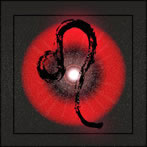
Leo (July 22-Aug. 23) — You may find yourself in a leadership position requiring the utmost diplomacy, which in turn will prompt you to summon your gift for psychological insight. Once you understand where someone is coming from, their conduct will have a different meaning, and you will have a much better idea how to approach them. One thing described in your solar chart is allowing any potentially hot situation to cool off. Another is bearing in mind the places that a person is hurt without playing into their pain or sense of injury. Finally, taking responsibility for your part will show others that it is safe for them to take responsibility for what is theirs. You are definitely in a lead-by-example moment. And in this moment, you will learn a lot more listening to your intuition than you will from attempting to verify things in words. Save that project for next week.

Virgo (Aug. 23-Sep. 22) — You may be finding it especially easy to think what you might not ordinarily think, which is a hint that you can say what you might not ordinarily say. There is a rare condition in the sky right now involving Mercury (your ruling planet) and Mars (which is occupying your sign) that is allowing you to take multiple viewpoints simultaneously. For example, you might discover that you can speak from two or more distinct points of view, expressing yourself equally deeply, and coherently, from any of them. You may notice you have a similar listening skill, to hear anything related to you from a number of points of view. This will be helpful at getting you to transcend some of the intense criticism or self-criticism you may have been experiencing lately. Whatever you may think, there is always another point of view. There is always another way of looking at the world.
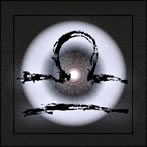
Libra (Sep. 22-Oct. 23) — Events of the past few days seem to have cracked your shell and set you free from a binding you may not have known was there. Or did you? The way you’ve found out other times was through a similar experience of a boundary giving way. You often live in what seems like a Chinese puzzle, consisting of many intricate, interconnecting chambers, and you always seem to be exploring or bursting out of one or another. Lately, however, you’ve come through a big one, which may have been initiated by inner circumstances, outer ones, or some invisible force for transformation. I would remind you that you’re still vulnerable as a result of this. Be cautious who you share with. I suggest you move slowly and gently, and not overestimate your strength. A lot of your emotional blood is rushing in the direction of a world of feelings that you’ve discovered, most likely pleasant, certainly a bit strange, potentially associated with a loss of some kind. Easy does it. What you experienced is real and it has taken you to a new space within yourself.

Scorpio (Oct. 23-Nov. 22) — Be conscious of the presence of any ‘third parties’ in your intimate encounters, or even in the space of your most private fantasies. It could be some sensation of a group influence, including that of your family and what you think they want from or for you. It could be your closest friends and the rules that they’ve set for one another. Or it could be a pattern that you’ve internalized based on any or all of the above. This presence is likely to feel like it ‘wants you’ to put the brakes on any passionate experiences you may have, or want to have. It may be such a consistent inner presence that you have no idea what life would be like without it. This weekend’s Full Moon in your opposite sign Taurus is giving you a rare opportunity to feel and see this conditioning for what it is, and to make a conscious choice whether it really serves you. You may need to choose again every time you feel it, which is part of the process of taking charge of your life.

Sagittarius (Nov. 22-Dec. 22) — Just because you’re questioning a commitment, or your idea of commitment, does not suggest you want out. What it does suggest is that you’re ready to make adjustments to your situation that are oriented on establishing some balance. I don’t suggest you get too carried away with that idea, however. A little goes a long way, and nature has a way of evening things out over time. Stick to the very basics of nourishment. Make sure whatever situation you’re in provides the food, water and sufficient rest for everyone involved. Ask if you have any desires or needs that have been left out of the discussion entirely — and check in on the same topic with anyone who you might be involved with. In truth, a real exchange requires everyone to be open, so that they may give and receive. Open implies vulnerable. Where do you stand with that?

Capricorn (Dec. 22-Jan. 20) –Recent aspects have brought out a side of your nature that you might have never considered ‘going public’ with, though you just might be having that idea now. One persistent question is, why are certain things we’re supposed to keep secret really in that category? What is the purpose of a general ban in admitting your deepest inner reality when it matters the most? There is a purpose — though it has nothing to do with YOUR purpose. It seems like you’ve arrived at the point where you’re ready to start openly asking questions you’ve been brewing for a long time. There’s no need to do this in The New York Post. The place to have the discussion is among friends. One quality of your sign is that it’s essential for you to share actual values with the people you spend time with. Speaking your mind and your feelings will pull that issue into focus, so you can get a good look at it.
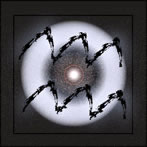
Aquarius (Jan. 20-Feb. 19) — Events over the next few days may raise your awareness of an internal influence associated with controlling others. Under certain circumstances it may spook you a little, because you recognize it’s a little creepy. However, you’re not the only one who has this experience — it’s something that influences all of society; you just happen to be picking it up on your inner tuner. Think of it as a distorted impulse to take responsibility for yourself, your choices and your actions. Once you see it that way, it’ll make a lot more sense, and your intuition will guide your focus away from others and onto yourself. You may then grapple with the issue of whether you should, or can, control you. I would note that control is a different thing than making conscious choices, or being accountable for your own feelings. Very, very different.

Pisces (Feb. 19-March 20) — Whatever you do the next few days, reserve some of your creative energy for yourself. It’s true that you’re busy and that your life is moving fast right now; relationship or partnership experiences may be distracting you (though thankfully things are making a bit more sense than they did with Mercury retrograde, as it was recently). Devote some of your primetime and prime resources to doing what you want to do the very most: what you consider your real art, your personal, intimate or impassioned writing, and spending some time with the people you care about most dearly. Part of the challenge of having a successful life is making sure that you have some balance between what you must do (even if you like it) and what you want to do, even if you consider it optional. In truth, it’s anything but.
To unsubscribe, click here
e Wiki | Friends | Editors | Contact Us
Copyright © 2013 by Planet Waves, Inc. All Rights Reserved. Other copyrights may apply.
Some images used under Fair Use or Share Alike attribution.

